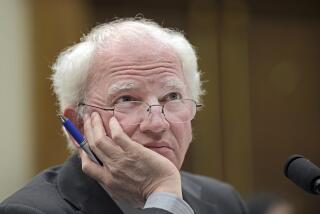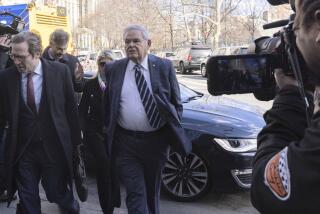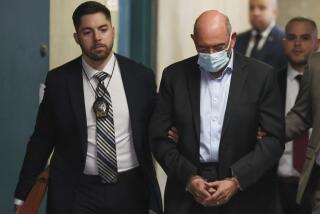John Edwards pleads not guilty: ‘I did not break the law’
“There is no question that I have done wrong,” John Edwards said Friday in front of the North Carolina courtroom where he pleaded not guilty to six counts of violating federal campaign laws. “I take full responsibility for having done wrong.”
But, Edwards said, he did not violate federal law.
“I will regret for the rest of my life the pain and the harm that I have done,” the former Democratic presidential candidate said, “but I did not break the law and I never, ever thought I was breaking the law.”
With that, Edwards, along with his oldest daughter, Cate, departed in a car, with reporters trailing behind.
Appearing in federal court in Winston-Salem, Edwards, 57, was released on his own recognizance, according to CNN. He was ordered to stay away from campaign benefactor Rachel “Bunny” Mellon, whose alleged donations to his 2008 presidential effort lie at the heart of the government’s prosecution of the ex-North Carolina senator. He also surrendered his passport and was ordered to remain in the continental United States.
Edwards is accused of accepting more than $925,000 in campaign donations and then using the money to cover up his affair with ex-campaign aide Rielle Hunter.
The case against Edwards could easily rise or fall on whether the government is reaching too far, and trying to hold Edwards to a higher standard than normal election law provides in part because of the sordid details of his liasion with Hunter while his wife, Elizabeth Edwards, was struggling with terminal cancer.
Even in the first paragraph of the 19-page indictment returned Friday by a North Carolina grand jury, the document took the quite unusual step of stressing that a “centerpiece” of Edwards’ candidacy in 2008 was “his public image as a devoted family man” and that he often stressed to voters that “family comes first.”
Add to that the fact that federal officials in Washington in the Justice Department’s Public Integrity Section worked collaboratively with prosecutors in the U.S. attorney’s office in North Carolina, and a picture emerges to some experts that the government is seeking to severely punish Edwards as much for his marital infidelity as for allegedly violating campaign financing laws.
Indeed, four prosecutors from the Public Integrity Section signed the indictment, including the section’s chief, Jack Smith.
Several experts in election law said they did not know of any similar case in the past where prosecutors brought criminal charges against a candidate for using money from a wealthy contributor to hide a personal matter. Normally such alleged violations are typically handled as civil penalties and often result in fines and requirements for the candidates to repay the money.
That theory also appears to lie at the heart of the defense strategy. Outside the Winston-Salem courtroom Friday, Edwards attorney Gregory Craig called the prosecution “unprecedented” and said Edwards “has broken no law.”
To that end, the defense team brought on board Scott E. Thomas, a former chairman of the Federal Election Commission with 20 years of service on the panel, and he quietly met six weeks ago with prosecutors in an attempt to persuade them not to seek criminal charges.
“I do not believe that there is any prior case that states that the conduct at issue in the Edwards matter, or even conduct substantially similar to it, constituted a violation of the statute,” he said.
Other outside experts agreed.
“This is a real stretch,” said Michael Toner, a former FEC chairman appointed by President George W. Bush. “And I say that as a Republican who is no fan of John Edwards.”
The indictment says that Edwards conspired with two of his wealthy contributors to send checks to his girlfriend, and that the checks were secret campaign contributions. A contribution is defined broadly in the law as “anything of value” given “for the purpose of influencing any election for federal office.”
Prosecutors allege the former senator was in fact accepting “contributions” to his own campaign when he arranged to have money sent to his girlfriend. One charge accuses him of making “false statements” — not by lying to the FBI or under oath, but instead by not reporting the secret contributions in the reports his campaign filed with the FEC.
Trevor Potter, a former FEC chairman who represented Sen. John McCain in his presidential campaign, said election laws are complicated and that criminal charges are rare. “By statute, a matter is not criminal unless there is intent—evidence of a ‘knowing and willful violation’ of the law,” he said.
These lawyers questioned how Edwards could be charged with a “knowing” violation of this law when it was not clear that the secret payments to a girlfriend qualified as “campaign contributions.”
james.oliphant@latimes.com
richard.serrano@latimes.com
david.savage@latimes.comMore to Read
Get the L.A. Times Politics newsletter
Deeply reported insights into legislation, politics and policy from Sacramento, Washington and beyond. In your inbox three times per week.
You may occasionally receive promotional content from the Los Angeles Times.








